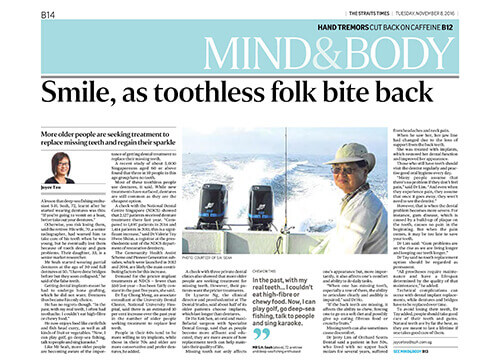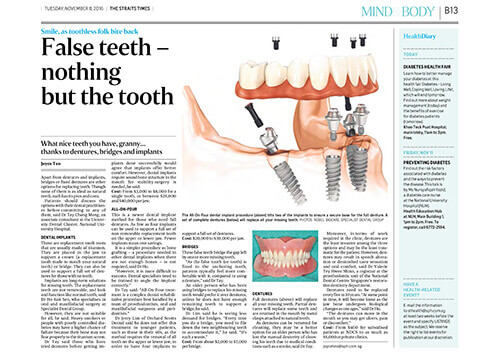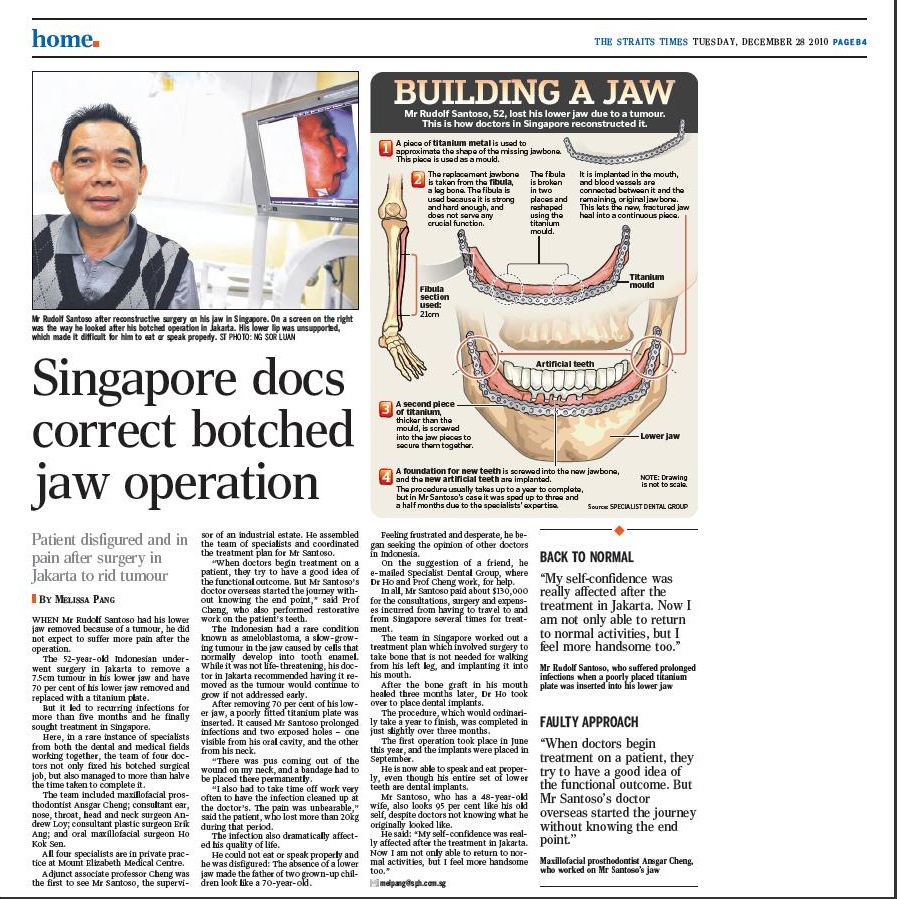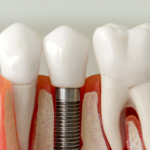Dental Implants in Singapore
Book a 30-minute consultation with our specialists or surgeons to get started on transforming your smile with dental implants.
Or call: +65 6734 9393

Tooth Implants by Trusted Dental Clinicians
Dental implants are a permanent solution for replacing missing teeth, providing the look, feel, and function similar to natural teeth. Pioneering dental implant treatment, our clinic’s late founder, Dr. Henry Lee, first placed titanium dental implants in Singapore in 1984.
At Specialist Dental Group, our team of dental specialists continue to provide expertise in dental implantology and peace of mind for patients.

What Are Dental Implants
Dental implants, also referred to as tooth implants, are artificial foundations crafted to substitute the roots of missing teeth. They not only resemble but also function like your original teeth. They are typically made from titanium screws, which offer a sturdy foundation for teeth replacements like dental crowns, dental bridges, or dentures.
For individuals experiencing complete tooth loss in either the upper or lower jaw, dental implants can help anchor a complete arch denture firmly, presenting a dependable and lasting solution. Besides this, dental implants can cater to single or multiple missing teeth, ensuring they look, feel, and function like your original teeth. This is because they can replace a single tooth without impacting adjacent teeth and support dental bridges in situations with multiple missing teeth.
Given how dental implants can be used flexibly in various dental scenarios, opting for this dental treatment provides a significant advantage in the long term.
Different Types of Dental Implants
When considering tooth implant solutions in Singapore, there are various types of dental implant systems available:
Single Tooth Dental Implant
Single tooth dental implant is typically recommended when a single tooth needs to be replaced. The procedure replaces the lost tooth and its root while the neighbouring teeth is not affected. Patients requring this procedure may be due to tooth decay or injury.
All-on-4 Dental Implants
This technique offers a full-arch rehabilitation with four dental implants. It is generally recommended for patients experiencing substantial tooth loss or limited jawbone density. As the All-on-4 dental implant method minimises the need of bone graft, it may reduce the healing period, restoring functionality and aesthetics within a shorter timeframe.
Trefoil Dental Implants
The Trefoil system is designed with efficiency in mind. It offers patients a fixed and full-arch solution for the lower jaw, often on the day of surgery. By optimising the use of available bone and streamlining the procedure, a Trefoil dental implant system not only expedites treatment duration but may often be more economical as only three dental implants are used.
It is advisable to consult a dental specialist to assess your oral health and ascertain the most suitable implant solution.
Who Needs a Dental Implant Procedure
Dental implants improve the quality of life for individuals who have experienced tooth loss due to decay, gum disease, dental trauma, or congenital conditions. As such, your dental specialist in Singapore may recommend dental implants based on your situation. This includes:
- Advanced age: As individuals age, the likelihood of tooth loss due to natural wear and tear or poor oral hygiene may increase.
- Significant tooth loss: People who have lost multiple teeth or are facing complete tooth loss are more likely to require dental implants for tooth replacement.
- Insufficient bone structure: Adequate jawbone density is necessary for dental implants. Individuals with significant bone loss may require additional procedures, such as bone grafting, to augment the bone structure for successful implant placement.
- Past dental setbacks: Dental implants may offer a stable and long-lasting solution for individuals who have experienced setbacks with other tooth replacement options.
For instance, when the teeth fail, the jawbone may shrink over time, causing it to become relatively thin after several years. A narrow jawbone may not be able to support dentures, and the jawbone may be susceptible to fractures. However, studies have shown that dental implants may help to maintain the volume of healthy jawbones over time.
Dental Implants Treatment Process
Your dentist will review the details of your medical and dental history, go through a consultation and examination, and take an x-ray of your teeth and jaws to ascertain your suitability for dental implants. Your dental specialist will then consider factors such as oral health, bone density, and the need for potential preparatory procedures like bone grafting.
Once the necessary information is gathered, your dentist will explain all findings, address your queries, and provide professional recommendations. This process will be as informative and comfortable as possible, ensuring you feel confident about the decisions you’re making for your dental health.
During dental implant procedures, various types of anaesthetic options may be employed depending on your comfort, overall health, and the complexity of the treatment. The most commonly used are local anaesthesia (which numbs the surgical area) and intravenous sedation (which provides a deeper level of sedation).
Your dental specialist will determine the appropriate method during your consultation and tailor it to your needs to ensure optimal comfort during the implant procedure.
An integral part of the dental implant procedure involves the placement of a titanium screw – the dental implant. This is a customised device that is placed into your jawbone and serves as a replacement for the root of your missing tooth.
Unlike other materials, titanium has a unique property that helps it to fuse with your bone through a process known as osseointegration. This can make the implant stable and secure, becoming part of your jaw. The implant then serves as an anchor for your new tooth/teeth. Temporary replacement teeth will be fabricated and fitted on the same day as your implant placement so you can leave your dental clinic with teeth.
After the tooth implant procedure, the surgical site usually stays numb for approximately 2 hours. Bite onto the provided gauze for an hour. Avoid spitting, rinsing, or brushing on the post-surgery day to prevent dislodging the blood clots. Consume only cold or room-temperature food and drinks, ideally on the untreated side of your mouth. If you experience any discomfort post-procedure, you may seek advice from your dental implant specialist for prescribed medication.
After two to six months, once the bond is formed between the implant(s) and your bone (a process called osseointegration), new permanent teeth (implant crowns) can be firmly attached to the implant(s).
The dentist will take a precise impression of your teeth and fabricate the replacement teeth (dental crowns) to attach to the dental implants. Creating these permanent teeth is a meticulous and personalised process, as this dental mould will be a replica of your mouth, capturing every detail, contour, and alignment of your existing teeth. This helps ensure that your new tooth or teeth will fit perfectly within your bite and match your natural teeth in size, shape, and colour.
The impression is then sent to a dental laboratory, where the technicians fabricate the final replacement teeth or dental crowns. These crowns are made with high-quality, durable materials designed to be visually appealing and withstand the functional demands of daily chewing and speaking. Once completed, your new teeth will look, feel and function like your original teeth.
Dental implants, a preferred solution for missing teeth in Singapore, require meticulous aftercare to ensure longevity and functionality. As dental implants function similarly to your original teeth, it is advisable for you to adhere to a thorough dental care routine. This involves:
- Brush with fluoride toothpaste at least twice daily.
- Floss at least once a day. Your dental specialist may recommend using specialised toothbrushes or floss designed for dental implants to ensure optimal cleaning.
- Commit to regular dental check-ups with a dental specialist in Singapore every six months for a thorough assessment and professional cleaning is crucial.
For optimal longevity of your dental implants, avoid chewing or biting on hard and sticky foods to prevent damage. In addition, limiting or avoiding the consumption of acidic or sugary foods and beverages is advisable. With proper care, your dental implants can last a significant time. However, individual factors and oral health habits can impact the lifespan of implants.
On the contrary, failing to maintain your dental implants properly may lead to complications such as infection, implant failure, and gum disease. Hence, the key to long-lasting results lies in routine care, regular check-ups, and open communication with your dental implant specialist. Proper post-procedural care not only ensures the health of your implant but also the overall well-being of your oral cavity.
Fees for Tooth Implants in Singapore
At Specialist Dental Group, dental implant fees range from $6,200 to $6,600 per tooth. Factors influencing dental implants fee:
- Complexity of the procedure
- Location of the tooth
- Dentist’s level of experience
- Additional treatments such as bone graft or sinus lift
For our Singaporean and Permanent Resident patients, part of the dental implants fee can be covered using Medisave. For more detailed information on how you can utilize your Medisave benefits for dental implant treatment, please visit our Medisave page.
Please note: The stated fee range covers only the dental implant surgery and implant crown. It does not include other potential aspects of treatment.
Download Your Dental Implant Guide in Singapore
With so many treatment options available, our guide helps to narrow down your search for the right treatment for you. Our essential guide covers the cause of tooth loss and pain, comparison of dental implant options, treatment process, fees and more!

Meet Our Dental Specialists & Dentists in Singapore for Your Dental Implants
Choosing the right provider for dental implant treatment is a decision that should be based on trust, experience, and professional qualifications. Specialist Dental Group’s commitment to our patients is to solve their dental needs with care and assurance in a timely manner.
We prioritise understanding and meeting individual needs, from the first consultation to post-procedure follow-ups.
Our dental specialists have trained at leading dental institutions globally and are accredited by renowned dental boards. They also consistently stay abreast of the latest dental technology and technique advancements through continuing education courses. We have a solid track record in dental implant procedures, and they use their expertise and current technology to provide reliable and pleasing outcomes with dental implants.Our fully trained team is dedicated to keeping that brilliant smile of yours ever glowing. With our combination of skills, credentials, patient care philosophy, and a history of successful outcomes, Specialist Dental Group is the top choice for your dental implant needs in Singapore. Trust us to restore not only your smile but also your confidence and quality of life.
Media Coverage

Media Coverage – Straits Times – Smile, as Toothless Folk Bite Back

Media Coverage – Straits Times – False Teeth – Nothing but the Tooth

Media Coverage – Straits Times – Singapore docs correct botched jaw operation
















